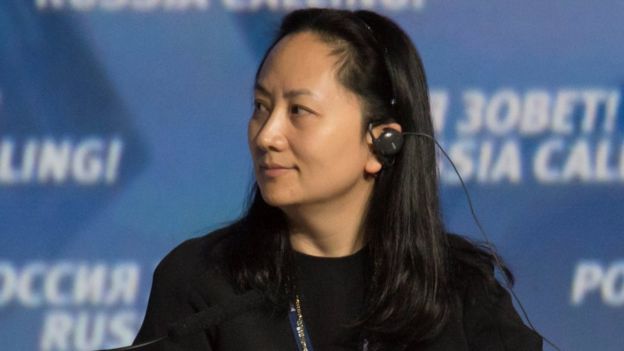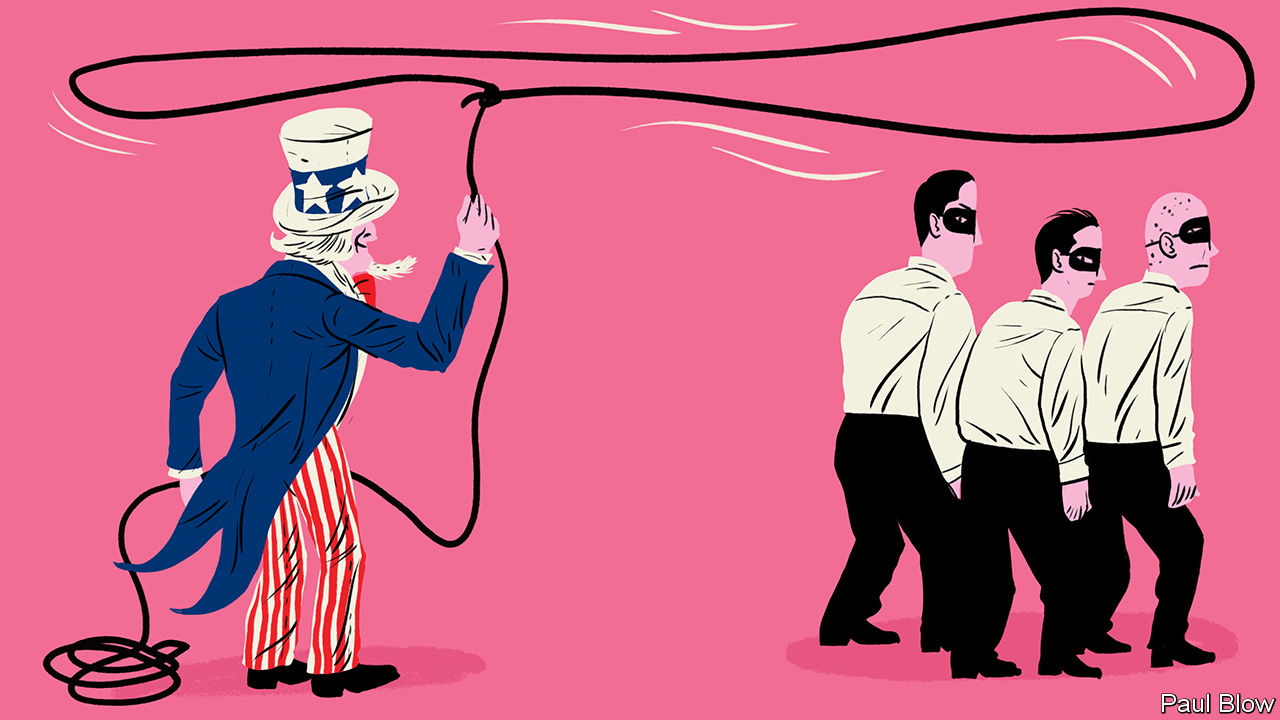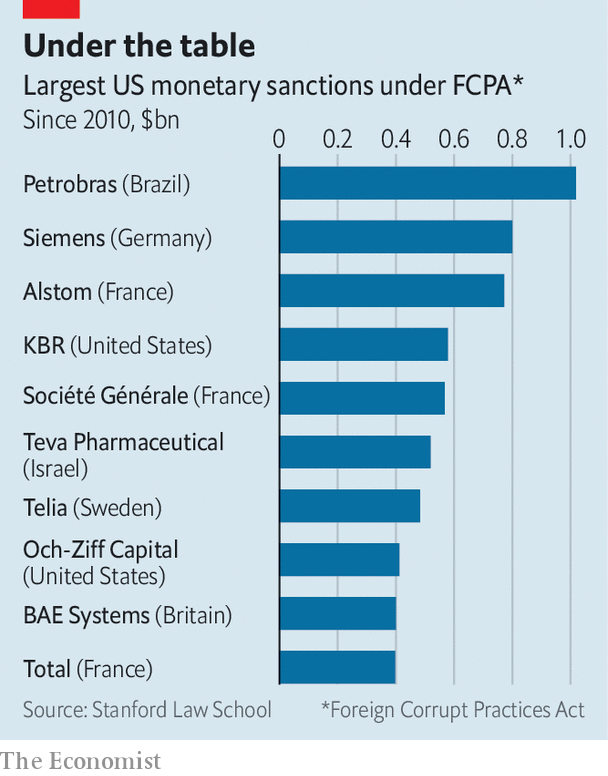Uncle Sam’s game
Canada’s arrest of Meng Wanzhou, Huawei’s finance chief, is the latest example
Print edition | Business
Jan 17th 2019 | PARIS
VANCOUVER AIRPORT is an unlikely venue for the genesis of a global spat. But repercussions from the detention by Canadian authorities of Meng Wanzhou while in transit there on December 1st are still spreading. Ms Meng, finance chief of Huawei, and daughter of the giant tech company’s founder, Ren Zhengfei, was arrested at the request of American prosecutors investigating the firm’s alleged business ties with Iran, which is under American sanctions. Chinese authorities have arrested a number of Canadians in response; this week a court sentenced another to death for drug- smuggling (see
).
Ms Meng is not accused of breaking Chinese laws, nor those of Canada. That matters little. Since the turn of the century, America has ramped up judicial programmes whose reach is not restricted by its borders. Focused on enforcing its sanctions, reducing corruption in poor countries and fighting money-laundering and terrorism financing, it has found ways of prosecuting companies and their executives far beyond its shores. Ms Meng, who is out on bail and preparing to fight extradition in a hearing expected next month, could face decades in jail.
America’s aims are often laudable. Much wrongdoing has been brought to light, and probably prevented, as a result of its actions. But the continued growth of such programmes is raising questions about the fairness of America imposing its mores in overseas jurisdictions. Most of the companies caught in its legal net are foreign, often European. Some come from countries in which doing business with Iran, for example, would be no problem were it not for America’s stance. As a result, critics who decry what they call America’s financial imperialism are looking for ways to limit its reach.
Policymakers and business figures in Europe are peeved at having to heed American laws, and they suspect other motives. “European companies are increasingly impacted by the extraterritoriality of US sanctions,” says Pierre Gattaz, head of BusinessEurope, the European Union’s main employer federation. “Moreover, these are increasingly instrumentalised to promote economic interests,” he adds. There are instances where America’s long legal reach may have given an edge to its own firms over foreign rivals, as in the case of General Electric’s purchase of Alstom of France in 2014 (see
). Ever mindful of diplomatic norms, President Donald Trump has linked Ms Meng’s legal fate to the prospects of America getting a good deal in trade talks with China.
It is America’s central role in the global economy that gives it the exorbitant privilege of imposing its way in boardrooms across the world. Some forms of sanctions merely ban companies trading in embargoed countries from selling to America. Other programmes, notably the Foreign Corrupt Practices Act (FCPA), which battles against corporate graft, can result in prosecutions in criminal courts.
Several elements tie together America’s various legal forays abroad. The first is their creeping extraterritoriality. American law starts with a presumption against application of its statutes beyond its borders. But prosecutors have wide authority over how the laws are interpreted. They have adopted an ever-more-expansive interpretation of who is subject to American law, lawyers say.
A banking transaction that ultimately passes through New York—as many do, given the centrality of American dollars to global trade—can give prosecutors a toehold to inspect it. If two executives outside America use Google’s Gmail to communicate about a bribe, say, American prosecutors can claim that the Americanness of the email provider can make it their business.
The global banking system also gives America an advantage. Lenders have been hit hard by American prosecutors, notably BNP Paribas, a French lender walloped in 2014 with an $8.9bn fine for facilitating trade with Sudan, Cuba and Iran. Deutsche Bank was fined $425m in 2017 for helping launder $10bn from Russia. No surprise that most banks would sooner denounce a dodgy client to America’s authorities than keep doing business with them.
Along with companies, some banks have had to agree to “monitors”—independent observers paid for by the firm but reporting to American authorities—as a condition of avoiding prosecution. According to the
Wall Street Journal, it was one such monitor at HSBC (which agreed to monitoring after being fined $1.9bn in 2012 for allowing Mexican drug cartels to launder money through its systems) who notified American prosecutors of suspicious transactions at Huawei. It is the charge that she may have tricked banks into, in effect, busting sanctions, which Huawei denies, that seems to be dogging Ms Meng.
It seems plain to foreign critics that America disproportionately targets foreign companies. Over three-quarters of the $25bn it has exacted in fines for money-laundering, sanctions-busting and related offences has been against European banks, 15 of which have paid over $100m each, according to Fenergo, a consultancy. American banks have been fined less than $5bn over such misdeeds (though they have been clobbered for other transgressions, such as fraud connected with subprime mortgages). Anti-corruption probes also fall disproportionately on foreign firms. Of the ten biggest FCPA fines, only two have fallen on American companies (see table).
Proving America treads more lightly at home than abroad is tricky. There may be good reason for the asymmetry. Petrobras, the scandal-laden Brazilian oil and gas firm that recently became the largest FCPA fine recipient, seems worthy of its crown, for example. Europe tolerated corruption at its firms for longer, and their proclivity for doing business in tricky parts of the world may still trip them up. American companies pride themselves on the thoroughness of their FCPA compliance programmes. Meanwhile, the Huawei arrest is an exceedingly rare example of a big Chinese company coming within the ambit of American authorities. (“Because Chinese firms never bribe anyone, of course,” snarks a European boss, who suspects geopolitical factors are at play).
The sanctions against Iran, which America reimposed unilaterally three years after a global embargo was lifted, in particular angered European companies. Total, a French energy group, and Siemens, a German engineering outfit, were among those who have reluctantly had to forgo opportunities in a market which European firms have long coveted. Their political allies worry that extraterritoriality could become weaponised under Mr Trump to help American firms overseas. France and Germany are leading efforts for their companies to be able to keep trading with Iran, through a state-backed “special purpose vehicle”, although progress is slow.
America’s activism is prompting other countries to improve their own graft-busting. “Often, the US has taken on corruption cases because others have been unwilling or unable,” says Robert Amaee of Quinn Emanuel, a law firm. That may be changing. Britain has hired an FBI alumna, Lisa Osofsky, to head its Serious Fraud Office, and is now starting to push companies into American-style settlements rather than taking them through protracted court cases. From Singapore to France, anti-bribery investigators are co-operating with their American peers—and getting a cut of the fines levied from companies in return. If you can’t beat them, join them.




